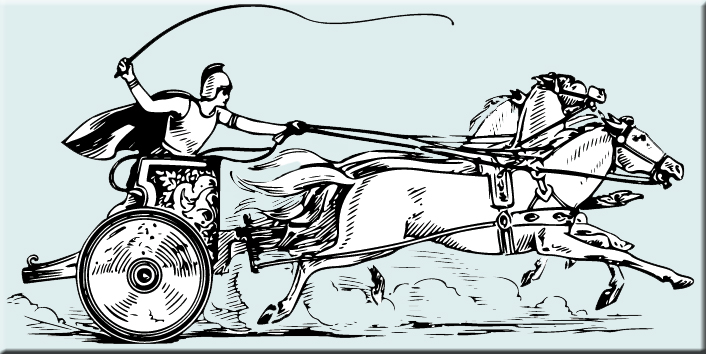
Creative Commons Attribution-Noncommercial-Share Alike 3.0 Unported License
Roman chariot image from publicdomainvectors.org/en/free-clipart/Roman-chariot-image/57989.html
Abstract
 In the context of this paper, seekers are people who have the sense of being more than their physical body and who make a conscious effort to understand what that means. Seekers often describe themselves as a spiritual being having a physical experience. A seeker’s progression is sometimes thought of as increasing discerning intellect leading to greater lucidity. While greater discernment is thought to represent personal improvement, greater lucidity is thought to be a prerequisite for more conscious Psi functioning.
In the context of this paper, seekers are people who have the sense of being more than their physical body and who make a conscious effort to understand what that means. Seekers often describe themselves as a spiritual being having a physical experience. A seeker’s progression is sometimes thought of as increasing discerning intellect leading to greater lucidity. While greater discernment is thought to represent personal improvement, greater lucidity is thought to be a prerequisite for more conscious Psi functioning.
Current instruction for seekers focuses mostly on meditation and attitude adjustment. This tends to lead to trust in a “spirit told me” assumption of truth. The seeker’s task as a developing psychic is to learn to look beyond mental storytelling about sensed information to the actual sensed information. That is described here as aligning worldview with the actual nature of reality.
This paper is intended to provide useful instruction for seekers based on traditional instruction as it is updated by emerging understanding about the way we develop perception.
Contents
Abstract
The Seeker’s Way
Terms.
The Antiquity of Seeking
Objective of Seeking
The Two Mind Model for Self
Conditioned Perception of Reality
Life Fields
Becoming Lucid
Perception
Two Minds
Instincts
Temperament and Personality Types
Temperament Mediated Perception
Becoming Lucid
The Way of the Teacher
References
The Seeker’s Way
We each have a different way of experiencing our world. Some people are more empathetic than most. They might feel the influence of someone’s mental anguish before becoming aware of why. Sometimes, people sense things that seem out of place; paranormal things like ghostly voices or unusual empathy for some people.
Mainstream society tells us such experiences are imaginary. We are taught from youth to ignore such experiences. Our human’s instincts tell us to obey the popular wisdom by trying to fit in with the rest. Yet for many of us, apparently paranormal experiences evoke too many questions. The sense that there is more to our world than we are told leads us to ask questions that it seems can only be answered by understanding our spiritual nature.
Our sense of otherworldliness is an itch that is not easily scratched. It has caused many of us to begin a lifelong search for understanding. We were the Beatniks, then the Hippies and eventually the New Agers. Some of us became parapsychologists, some are practitioners learning to work with apparently paranormal phenomena to produce examples that are, for the most part, too astounding for mainstream society to embrace.
All of us are learning to experience our world as it is and not as we have been taught.
Terms
The model used in this paper to describe the dynamics of seeking represents a fundamental view. The way some of the terms are used may be unfamiliar. To be sure we are on the same page, here is the intended meaning for some of the more abstract terms:
Mind – The part of who we are that includes the functions necessary to produce perception and expression. Mind includes a worldview functional area representing memory cultural training and acquired understanding.
Mind is modeled in Physicalism as an emergent quality of bioelectric activity in the brain referred to as the consciousness field. However, in this paper, mind is considered a nonphysical aspect of who we are that is native to the Psi Field.
Nonlocal – This term is used to indicate that information can be psychically accessed from any part of reality. Also in nonlocality, psychokinetic influence is not limited by distance. When mind is explained as an apparently nonphysical characteristic of who we are, mind is said to be nonlocal or not in our head.
Etheric – Etheric is an old term referring to the greater reality. That aspect of the reality field that is not physical. The term has been traditionally used to describe the subtle, underlying media supporting reality. The etheric is the matrix of reality. Sometimes phrased as etheric space.
Psi – The influence of thought. This may be mind-to-mind (telepathy, mediumship). It may be an etheric-to-physical influence as in Instrumental TransCommunication (ITC). Psi is involved in such phenomena as anomalous access of information (psychic, mediumship or clairvoyance), healing intention (Therapeutic Touch for instance and intercessional prayer) and psychokinesis (levitation, precipitation, apport).
Psi Field – Parapsychologists theorize that a subtle field, referred to as a Psi Field, permeates physical space. The existence of such a field is required to explain Psi functioning. The Psi Field Hypothesis holds that a subtle field functions as a medium of propagation for the influence of thought (intention).
In Physicalism, the Phi Field is considered an emergent quality of physical space. In Dualism, reality can be modeled as etheric space. In that sense, the Psi Field is either the same as etheric space or it is an aspect of etheric space.
There are four important characteristics of the hypothetical Psi Field:
-
- Mind and thought are not physical and appear to behave independent of physical principles.
- The Psi Field is nonlocal, meaning that there is no apparent distance in the Psi Field (everywhere is here).
- There appears to be no physical way to shield from the Psi Field.
- For mind to influence physical things, there must be a nonphysical-to-physical interface.
Physicalism – The physical universe is all there is. It began with the rapid expansion of a singularity from which space, matter, energy and organizing principles natural emerged. As mind is modeled in physicalism, it ceases to exist when the biological organism dies.
Physical Dualism – In Physical Dualism, Physicalism is thought to be largely correct; however, mind, Psi and the Psi Field are emergent, nonphysical qualities of biological organisms. Mind ceases to exist when the biological organism dies but memory may continue indefinitely in the Psi Field.
Strict Dualism – In Strict Dualism, reality is said to have nonphysical and physical aspects. The nonphysical aspect is described here as the etheric (Psi Field). The physical aspect is functionally “in” the etheric as the collective expression of minds. For a person, mind represents a sentient self that is, in effect, a symbiotic life form (Mind 1). The biological organism (our human) is organized according to a morphogenetic mind (Mind 2). These two minds appear to be entangled via Worldview. See The Two Mind Model for Self below.
Concept – A fundamental idea; a root thoughtform from which systems of thought can be derived. For instance, the concept of something to protect a foot is the fundamental concept for shoes, sandals and such. As fundamental elements of thought, concepts might be considered a building block of reality, but more importantly, concepts are the building block of understanding.
Thoughtform – As a rudimentary etheric field, thoughtforms contain information about a specific subject. As an etheric field, they may be nested so that a thoughtform concerned with transportation, for instance, may contain information about all forms of transportation while a red wagon thoughtform would contain information specific to red wagons and would be a subset of the transportation thoughtform.
Worldview – Worldview is identified as a functional area of a life field’s perception forming process. It acts like a database containing memory, cultural training and instincts. In the case of a person (an etheric personality entangled with a human in an avatar relationship), entanglement is thought to occur as a shared conscious self and shared worldview. As such, the worldview we are concerned with in seeking contains human instincts and inherited discerning intellect.
Perception – Perception is our conscious awareness. It is modeled as the output of the mostly unconscious Attention Complex (See the Attention Complex Diagram below). Environmental information such as signals from our body’s senses and expressions from other life fields are processed according to Worldview to produce outward Psi signals and conscious awareness.
Lucidity – Lucidity is a term that was used in the early 1800s to describe the ability to sense our etheric and physical environment as it is and not just as we have been taught it is. The term is used in the same sense as lucid dreaming or clairvoyance (clear sensing). We are all lucid to some extent, but it is relative so that a good psychic is said to be relatively more lucid than the average person.
Temperament – In this paper, temperament refers to a person’s predisposition to approach understanding of experiences in a specific way. This concept is also known as personality type or learning styles.
Discerning Intellect – While Worldview informs perception and expression, the conscious intention to align perception and expression with the actual nature of reality leads to greater discernment. Discerning Intellect refers to the degree to which a person has aligned Worldview with the actual nature of reality.
The Antiquity of Seeking
The Hermetic Wisdom represents an important path for spiritual seeking that is thought to have originated in Egypt some 6,000 years ago.
Emerald Tablet – The so-called Emerald Tablet is one of the texts attributed to a priest or priesthood of early Egypt known as Hermes. It is described in very arcane terminology that only makes sense if read from the perspective of survival metaphysics. In it, Hermes is giving instructions to students in how to transmute the lead of their animal nature to the gold of their spiritual self. That is the “Great Work” of the Hermetic way toward greater lucidity. (1), (2)
After defining his terminology Hermes tells his students in Line 7:
“Thou shalt separate the Earth from the fire, the subtle from the gross, by means of a gentle heat, and with great ingenuity.”
In more contemporary terms, the Emerald Tablet is instruction for the Creative Process which is defined in this paper as “Changes in reality are expressed via personality’s attention on an imagined outcome with the intention to make it so.” (3)
The Creative Process is the basic function of consciousness. It involves the three major elements of perception: Focused attention, visualization or conceptualizing (imagined) and intention. The seeker must learn to manage the Creative Process by intending to conceptualize actual reality and not the version of reality taught by the community.
The Katha Upanishad – The Katha Upanishad is thought to have originated about 4,000 years ago in the Hindus Valley between Pakistan and India. It is based on the same oral tradition that gave us Sanskrit. It also includes instruction to the seeker, this time, from the God of Death explaining our spiritual nature and how to progress toward self-enlightenment. (4) The God of Death compared the seeker to a charioteer and his horses:
“Know the Self to be the master of the chariot, and the body to be the chariot. Know the intellect to be the charioteer, and the mind to be the reins. (Katha Upanishad 1-III-3.)
“The senses they speak of as the horses; the objects within their view, the way. When the Self is yoked with the mind and the senses, the wise call It the enjoyer.” (Katha Upanishad 1-III-4.)
He then explained the discipline required to achieve self-realization (Vishnu refers to self-realization):
“But the man who has a discriminating intellect as his driver, and a controlled-mind as the reins, reaches the end of the path – that supreme state of Vishnu.” (Katha Upanishad 1-III-9.)
The Tarot – The Major Arcana or Keys of the Hermetic Tarot consists of an illustrated deck of 22 cards. Each Key represents an important concept on the seeker’s path. Key Zero, The Fool represents the seeker at the beginning of a cycle of self-discovery and also the seeker at completion of a round of progression. In the Secret Wisdom Schools, completion of a cycle of personal development was sometimes marked with initiation into the next round of study.
The keys are typically arranged in three rows of seven cards with The Fool above. Keys 1 through Key 7 represent Powers or Potencies, those in the middle row – Key 8 through Key 14 – represent Organizing Principles or Agencies and those in the bottom row – Key 15 through Key 21 – represent Conditions or Effects. The idea is that Potencies are acted on by Organizing Principles to produce Natural Effects.
As Key 7, The Chariot (shown below) has element of the six preceding keys. For instance, the chariot box is the same gray cube representing the world in The High Priestess of Key 2 and The Emperor of Key 4. The Tarot is intentionally symbolic and intended to be only understood by “those who have eyes to see,” meaning seekers and not the average observer. (5)
Here is a quote from Paul Foster Case, one of the more contemporary teachers of hermetic wisdom (6) From page 94:
“A little self-study will convince you that your thought and speech are largely subconscious in origin. Your vocabulary depends on subconscious associative processes. Your sentences, your style, your figures of speech -all these take shape below the self-conscious level.”
 Key 7 of the Waite Deck. The chariot represents all seekers.
Key 7 of the Waite Deck. The chariot represents all seekers.
The two sphinxes represent our senses.
Note that the charioteer does not physically control the sphinxes.
Public domain image.
Modern Teachers – There are many modern-day teachers who have combined current research with ancient wisdom to provide guidance for people who wish to be more in agreement with the actual nature of the greater reality. An important teacher for me was Jose Silva, creator of the Silva Method (7). The method teaches many important human potential skills in the form of psychic functioning, including deep-trance clairvoyance and remote viewing.
Robert Monroe taught many important human potential skills from the perspective that we are more than our physical body (8). The Delphi University also teaches human potential in deep-emersion, multi-day classes (9). Builders of the Adytum, or B.O.T.A., offers a correspondence course in the Hermetic Tarot (10)
The material offered here is based on lessons learned by a longtime seeker. As an Engineer by training and by temperament, I have attempted to develop a metaphysical model intended to clarify what is necessary to gain greater lucidity. This model integrates lessons learned from Instrumental TransCommunication (ITC) which includes Electronic Voice Phenomena (EVP), current metaphysical thought and consciousness studies. (11), (12)
Objective of Seeking
The seeker’s objective is to align personal worldview with the actual nature of reality. In what is commonly referred to as “spiritual seeking,” attention is turned toward gaining greater understanding about our personal nature, the nature of the world and our relationship with the world.
The objective of seeking is often described in terms of becoming more self-realized where part of “realized” is conscious recognition that we have a spiritual nature and a physical nature. The second part of “realized” is a growing awareness of the spirit that imbues the world around us. This turning toward our spiritual nature is sometimes described in terms of:
- Becoming more lucid – In this context, lucidity means experiencing reality as it is, rather than as we are taught. One of the characteristics of a more lucid person is greater understanding of the operation of Natural Law. Here, “Natural Law” refers to the naturally occurring principles that organize reality. (13) (14)
Another attribute of increasing lucidity appears to be increasing conscious awareness of our psychic nature. First Sight Theory includes something of a ruleset for how our mostly unconscious mind develops the perception we eventually consciously experience. (15) (16) The last two Corollaries of the theory – Inadvertency and Frustration Corollary and Liminality Corollary – argue that we tend to become more consciously aware of our Psychic functioning as we learn to consciously manage our mostly unconscious perception-forming processes.
- Gaining discerning intellect – This is awareness of the need to examine beliefs. Most of our choices are dominated by the influence of our human’s survival instincts and cultural norms. By learning to habitually examine the implications of our thoughts and the choices we make, it is possible to align our worldview to better agree with the actual nature of reality. The reward is thought to be greater lucidity. (13)
- Becoming more “in tune” with nature – This is nature as Source or First Cause, not a father god sitting on a heavenly throne. Think Mother Nature. Seeking to be more in tune with nature is fundamentally the same as seeking lucidity or discerning intellect. Most of the seekers I have known have begun seeking in the context of a system of belief such as Christian or Hindu and have evolved toward a more universal way of seeking.
Seeking is more a way of life than a pursuit of curiosity. Remember the Zen Kōan: “Before enlightenment, chop wood, carry water. After enlightenment, chop wood, carry water” This material is not too complicated. It is just a little abstract. Expect to do much of the work through self-education. Thus comes enlightenment.
The Two Mind Model for Self
Basically, there are two seeker’s paths. One relies on meditation and behavior changes intended to increase the seeker’s sense of communion with nature. In effect, seekers following this path try to change their attitude in order to become more “at one” with nature. In terms of temperament, People who turn toward this path might be described as Amiable-Expressive personalities (see below). (17)
The second seeker’s path depends on observation of nature in an effort to understand our relationship with the greater reality. In this path, it is important to develop a sense of order based on the dynamics of Natural Law. The seeker learns to mentally relate a concept to its associated concepts and visualize how they interact. A common instruction for this way of learning is for the seeker to learn everything they can about everything. In a sense, this involves intending to develop a mental map of the world that is in agreement with a correct understanding of Natural Law. This would be the Analytical-Driver style of learning identified in the Social Styles identified by David Merrill and Roger Reid. (17)
It is important to note that both ways of seeking involve the seeker learning to manage the mental processes that produce conscious perception. An objective of this paper is to help seekers understand the mechanics of how they think. The Elements of a Life Field Diagram below is a very basic view of the functional areas of our mind that appear to be central to our progression.
Conditioned Perception of Reality
Since reality consists of life fields and their expression, the physical universe is modeled here as a collective expression of many life fields. We tend to experience what we expect, and if the unexpected comes along, it is modified (explained in other words) to conform to our mental model of how the world works. That is, we live in a world that we have been taught to see.
The implications of this unconscious “preprocessing” of information include:
- We tend to only experience what agrees with our worldview.
- What we do experience tends to be colored to better agree with worldview.
- Our conscious perception is mostly colored by our human instincts. The influence of our instincts is moderated by cultural teaching.
- Mental “chatter” is continuous and is about sensed information … a story of sorts. Conscious awareness of that chatter does not normally include awareness of whatever triggered a particular train of thought. Increasing lucidity implies an increase in a person’s ability to be consciously aware of the initial trigger.
- A person who lacks the lucidity to distinguish between perception based on actual input and mental storytelling might be considered delusional.
- Worldview is changed by a combination of experience and persistent expression of the intention to experience correctly. That is how worldview is evolved. A person who has an open-minded temperament, and who has had an apparent paranormal experience, is predisposed to misattribute apparently psychic, but otherwise ordinary experiences as paranormal. It is important to note that education is an antidote to such misattribution.
Life Fields
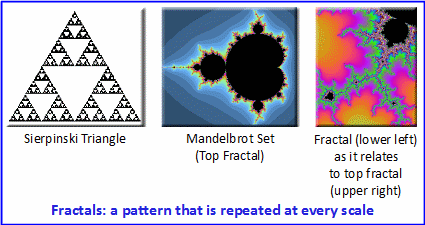 A fractal is a structure, shape or form that is formed in a similar way at all scales. For instance, the equilateral tringle is a fractal in the Sierpinski triangle—it is expressed the same at all scales. The Mandelbrot Set represents how an infinite number of “Apple Man” fractals are produced in imaginary space using a simple algorithm. In fact, navigating Mandelbrot Space is an interesting way to consider how to navigate etheric space. (18)
A fractal is a structure, shape or form that is formed in a similar way at all scales. For instance, the equilateral tringle is a fractal in the Sierpinski triangle—it is expressed the same at all scales. The Mandelbrot Set represents how an infinite number of “Apple Man” fractals are produced in imaginary space using a simple algorithm. In fact, navigating Mandelbrot Space is an interesting way to consider how to navigate etheric space. (18)
In this paper, an instance of life is modeled as a fractal organized with a set of functions that work together to facilitate the basic functions of life. Each has the same functional areas which are more or less expressed depending on their purpose and relationship with other life fields. (19)
The Elements of a Life Field Diagram below illustrates the basic functional areas of a life field that are thought to be necessary for the development and expression of sentience.
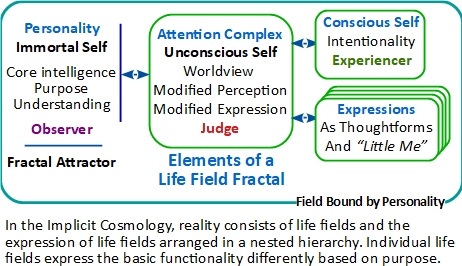
Referring to the Elements of a Life Field Diagram, basic functional areas of life fields are:
Personality (Observer) – A relatively immortal core personality representing purpose and retaining acquired understanding. The core personality is considered an unconscious function which binds the other functional areas in the life field.
Attention Complex (Judge) – A mostly unconscious complex representing intention, attention and choice. These are involved in the formation of conscious perception and outward expression based on memory, instincts, understanding and inherited purpose. The Attention Complex (Judge) is modeled as the arbiter of all signals to and from conscious self (Experiencer) and etheric Personality (Observer).
Expressions – Thoughtforms represent life field expressions. They may be simply a thought as in contemplation, a movement command to the body or an expression of intention to the perception-forming process. It is useful to note that the mind always produces expression as it tries to explain sensed information. Think of the streaming perception as the mental chatter we attempt to control while meditating.
Conscious Self (Experiencer) – Conscious awareness as the source of intention. Think of this functional area as a roving video camera. The camera operator has the ability to point the camera and express his or her intention for the video stream by making adjusting the exposure settings, it is the camera design that limits the recording. That limiting function is comparable to the Judge function of our Attention Complex.
Becoming Lucid
Becoming lucid is not normally a spontaneous process. It requires considerable mental discipline based on a good understanding of how we think. The motto on Etheric Studies website is to “Believe what you wish but understand the implications of what you believe.” (12)
To understand the implications of belief, it is necessary to have accumulated a solid understanding of things physical and how our mind translate experiences to better agree with expectations. It is through such self-education that the seeker learns to develop discerning intellect, and thereby develop greater lucidity.
Perception
Examination of the perception forming process tells us a lot about how to seek greater understanding. Referring to the Attention Complex Diagram:
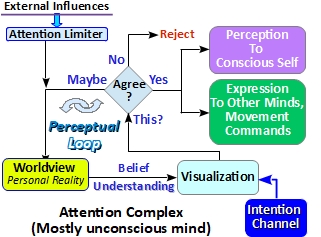
First Sight Theory (FST) is used here to offer a context to compare parts of the model described in this paper with the more mainstream model First Sight Model. FST proposes that people sense their environment psychically as well as with their physical senses and express psychokinetically as well as physically. Twelve corollaries are proposed based on those propositions. (15)
External Inputs – The information inputs are mainly physical-to-etheric signals from the biological body’s five senses. If Strict Dualism is correct, our mind also senses etheric-to-etheric Psi signals from other minds. The mind’s output is etheric-to-physical movement commands to the biological body and ether-to-etheric signals to other life fields.
It is important to note that the mind does not “see” the physical. Instead, conscious self experiences the physical as a story about the physical told by the mostly unconscious mind.
According to this model, in remote viewing for instance, a viewer’s sense of a distant location would be based on psychic access to someone presently sensing the location via their human’s physical senses or someone’s memory of having experienced the location. Either way, the raw sensory information would be modified to agree with the witness’s worldview and by the remote viewer’s worldview.
Attention Limiter – A person is presumably immersed in a huge number of environmental signals in the form of Psi information. The Attention Limiter enable the Perceptual Loop to focus on more important input. In terms of digital data, think of this as the router interface. A signal is ignored if it does not address the Attention Complex.
Personalness: The unconscious processes that constitute consciousness are personal and deliberate. FST Corollary (1).
Intention Channel – The one conscious influence a person has on perception is the influence of attention. A person can change Worldview and thus the nature of personal reality by persistently intending to do so. The degree to which intention influences personal reality is dependent on how well the person can focus the mind. The difference between a fantasy and an expression is the intention to make it so. One way to “intend” is to habitually examine the implications of thoughts, beliefs and choices as they occur.
Intentionality: Including or excluding information is a function of unconscious intention in regard to an element of potential meaning. FST Corollary (8).
Visualization – When we decide to speak, act or even when we think about something, we initiate a perceptual process to visualize or characterize what we want to say or do. A thoughtform can be described as a sort of gestalt thought ball containing the person’s current understanding about the subject.
Visualization may be initiated by environmentally sensed information, for instance our mind trying to identify a sound, or the expression of another mind. It may also be initiated by our mind.
Integration: Other preconscious processes are processed together with psi in a rapid, holistic, efficient, unconscious manner to format experience and action. FST Corollary (3).
Perceptual Loop – This is the mental process that determines acceptance, rejection or modification of sensed information. That process is based on the output of the visualization function. This is a streaming process in which:
Ignore: Information from the environment is visualized, compared to Worldview (personal sense of what is real), and if there is no recognition, it is rejected, and the conscious self does not become aware of the information.
Try again: The information is visualized, compared to Worldview, and if familiar, it may be modified for repeated passes through the loop. The visualized information will likely pass through the loop several times to be modified to agree with Worldview or finally rejected as being too great of a deviation from expected.
Accept: If it is a good match with Worldview, it is accepted and sent to the perception function to be consciously experienced.
Maybe: If the Perceptual Loop produces a maybe or ambiguous result, it may be accepted or modified, then accepted and sent to the perception-expression function. Ambiguous results are more apt to change Worldview.
Intentionality: Including or excluding information is a function of unconscious intention in regard to an element of potential meaning. FST Corollary (8).
Expression – The output of the Attention Complex is expression. When it is directed to conscious self, it is a thought. When it is directed to the biological body it is a movement command. When it is directed toward another personality, it is a psychic expression. When it is directed to a concept, it is an expression of intended order.
Summation Corollary: The content of conscious experience, emotional states and behavioral choices are constituted in a summative way by unconscious thought. FST Corollary (6).
Two Minds
Much of the ancient wisdom and modern seeking lore favors the idea that we are etheric mind entangled with a biological body. In this paper, that is treated as a symbiont-host relationship. There is evidence that biological organisms are supported by a form of morphogenic mind. This mind is referred to by Rupert Sheldrake as “Nature’s Habit.” (20) (21)
The Two-Mind Model of who we are is the proposal that our etheric personality (Mind 1) is the primary aspect of our conscious self; however, our human’s instincts (Mind 2) and survival needs represent the dominant influence on our thoughts and choices. When we say, “I am this,” we are referring to our physical self as both minds, but when we say that we survive physical death, we are referring to Mind 1.
A useful way to model the Two-Mind Model is to think of who we are as two distinct life forms. Our human (Mind 2) functions as a host or avatar for our etheric personality (Mind 1). Mind 1 is like a symbiont to the human mind. Based on the life field model discussed above, the point of entanglement for the two minds is the Attention Complex (above), specifically Worldview. If this is correct Mind 1 gives Mind 2 movement commands and receives body sensory information. Mind 2 is otherwise involved in “autonomous” operation of the body.
The purpose for a lifetime entanglement is supplied by Mind 1, but the pursuit of purpose is negotiated on a case-by-case basis with Mind 2. For the seeker, this means it is important to honor Mind 2’s influence, but to find ways to turn selected choices from more self-serving toward choices which are more influenced by purpose.
Instincts
The morphogenic mind (Mind 2) functions like the body mind or body image. It also supports the ruleset (instincts) controlling behavior of the organism. Our human is genetically predisposed to kill for food, protect its own at any cost and spread its genetic footprint as far as possible to assure dominance of its gene pool above all competition. In principle, these urges are moderated by cultural influences. It is important to note that apparently altruistic choices people make are more likely instinctual, gene dominated choices.
Our primary self (Mind 1) is organized by a personality from which we inherit what might be referred to as spiritual instincts. Those instincts appear to predispose us to gain understanding through experiences. While dominance over others is typically a Mind 2 trait, cooperation is more a Mind 1 trait.
A sort of “Veil of Forgetfulness” is a characteristic of entanglement between the two minds. The veil appears to help us integrate with our human. Else, we would likely focus on getting out of this lifetime. It also appears that when we enter into this lifetime, we do so with a sort of spiritual instincts or imperative to “live the life as a human but experience it as an immortal personality.”
The idea of self-realization is that our primary self (Mind 1) realizes that it is not the same as our biological body (Mind 2). This realization begins the gradual thinning of the veil. Without guidance, realization can be slight at first and take considerable effort to be a meaningful influence on our choices.
Temperament and Personality Types
Personal temperament or learning style turns a person toward interacting with the world in a particular way. A person’s temperament is based on previous understanding as maintained in the unconscious, core personality (Mind 1) and the human’s morphogenetic mind (Mind 2).
In support of this concept, we see from: “A study on human behavior has identified four basic personality types” (22):
“A study on human behavior has revealed that 90% of the population can be classified into four basic personality types: Optimistic, Pessimistic, Trusting and Envious.”
Also, from: “David Merrill & Roger Reid: Social Styles” (17):
“Assertiveness styles range from ‘asking’ behaviours to ‘telling’ behaviours, while our responsiveness varies from ’emoting’, or displaying our feelings, to ‘controlling’ our emotions.”
There are a number of systems used for modeling temperament. The styles of Merrill and Reid seem most useful for this discussion. They defined four behavioral styles:
Analytical – Thinking, thorough, disciplined; always a student of the subject
Amiable – Supportive, patient, diplomatic, healer and caregiver
Driver – Independent, decisive, determined; always thinking about the next step
Expressive – Good communicator, enthusiastic, imaginative; often the opinion setter
It is important for seekers to understand their temperament and how it influences the way they experience their reality. Referring to the Temperament mediated Perception Diagram below, while our human’s instincts dominate our decision making at birth, our temperament tends to influence all of our choices.
Be mindful that the term “tend” is used to here in the sense of “trending.” “Turn toward” is used in the sense that our attention and intention are inclined in a particular direction of choice. A thought that emphasizes one characteristic over another would be said to turn toward that one aspect but not rejecting the others.
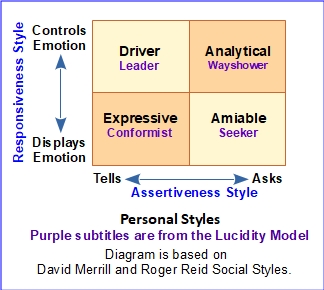
Seekers learn to recognize their style of learning. If their temperament turns them toward the Analytical way of relating to their world, they will be more inclined to examine the implications of their choices. That is one of the keys to successful seeking.
Temperament does not appear to be fixed but it is persistent. Part of seeking is to learn to find a balance between responding to environmental cues as our human needs, but as it is modified by our discerning intellect. Sometimes that might mean changing our first repose from Driver-Driver, for instance, to Analytical-Amiable.
To better support the seeking context of the Temperament Mediated Model (TMP) the Analytical temperament has been renamed as Wayshower. Seekers tend to become teachers and role models for other seekers.
People with a Driver temperament are more inclined to assume their choices are correct. As such, Drivers are thought to be more inclined to accept the influence of their human’s instincts without examination. While that assertiveness is useful for Leaders, Drivers are not generally thought of as seekers.
In the context of seeking, Expressives can be considered Conformist in that they are more apt to follow community normal.
In the context of seeking, Seekers often have an Amiable temperament in that they tend to be sensitive to the implications of their choices on the greater good.
Temperament Mediated Perception
The Temperament Mediated Perception (TMP) Model is based on observations of how people experience things paranormal and current understanding of the mostly unconscious development of perception. Its purpose is to illustrate the spectrum of mental influencers between spontaneous, instinctual reactions to the environment and mindful living.
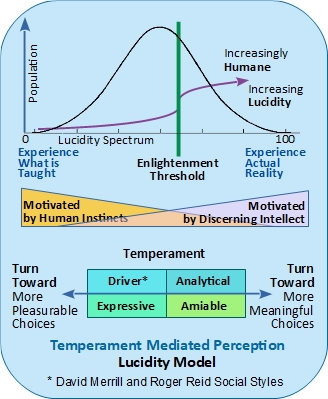
This subject is important to the study of perception because the way people mentally interact with their environment determines the choices they make and the kind of experiences they have.
Pleasurable or Meaningful – Following the lead of the Katha Upanishad, (4) the kind of choices people make tells us a lot about if Mind 2 or Mind 1 is driving their decisions:
Pleasurable – People tend to be more comfortable doing things that promote the dominance of their gene pool. Human instincts turn people toward behavior that promotes their stature in the community.
Meaningful – The basic assumption of ancient wisdom schools is that individuals are intended to experience reality as it is and not as it is taught. Choices that lead a person to progress toward that understanding are considered meaningful in that they are made with the intention to gain understanding in preference to having pleasurable experiences that promote the gene pool. This is not to say pleasurable is bad. It is to say that sometimes truly beneficial experiences may not come from the more pleasurable choice.
Lucidity Spectrum – The Lucidity Spectrum concept began as an effort to identify why some people experience paranormal phenomena and others do not, or at least not as clearly. As it turns out, the current political environment and conspiracy theories in the USA has provided ample opportunity to examine how people do or do not develop discernment. Virtually all of the analyses I have found point toward fundamental but poorly understood differences in temperament informing conservative or moderate choices. (23)
Enlightenment Threshold — The Enlightenment Threshold on the spectrum represents the realization that we are more than our body. This is not an event so much as it is a phase change that begins the process of a person consciously questioning if what is perceived is actual. It is at the Enlightenment Threshold that an average person begins to realize that they are not their body and thus begin seeking to discover what that means.
The curve represents a wild guess as to the distribution of people on the spectrum. The great majority of people never consciously reach the realization that what they experience is what they have been taught to experience.
Becoming Lucid
In seeking, the purpose is to moderate the influence of our human’s instinct while still participating with our human to engage in physical living. To understand the physical, one must engage in physical experiences.
Since we do not know the actual nature of reality, our one important tool for progression is persistently intending to see reality as it is. What are the implications of what we think is true? Is our sense of truth supported by reasonable evaluation of the evidence? Do our choices further our understanding or are they entirely in support of our human instincts?
Our worldview tends to confirm what is in it. Once a choice has been made, our internal Judge is very reluctant to change. By consciously intending to turn our choices toward the intention to gain understanding, by making a habit of consciously intending, we can gradually evolve our worldview via the Perceptual Loop.
Here are a few points to remember:
Mind as storyteller – Mind is hardwired to explain sensed information. In effect, mind outputs a continuous “stream of consciousness” dialog (chatter) about incoming information. The dialog is based on worldview, so if we are fearful about something, for instance, our mental chatter will tend to relate to that fear. The same is true of belief in things paranormal. If we are preoccupied about things paranormal, our mental chatter will tend to confirm that belief.
Distinguishing mental chatter from psychically sensed information – Research has shown that it is possible to psychically access information; however, it is difficult to distinguish it from mental chatter. For instance, in mental mediumship, is the medium sensing a discarnate loved one or is the medium hearing internal chatter about what he or she is trying to access? Information content is one way to tell the difference. Some psychics have achieved sufficient lucidity to tell the difference.
Hyperlucidity – As it is used here, hyperlucidity is a short-term change in behavior marked by the tendency to find phenomena everywhere despite considerable testimony by peers to the contrary. The concept comes from occasional reports of odd behavior exhibited by some people when they visit an emotionally charged place (Paris syndrome, Jerusalem syndrome) or experience great beauty (Stendhal syndrome). (24), (25), (26)
The effect of hyperlucidity is a witness’ mistaken belief in experiencing paranormal phenomena such as reporting voices in recordings when there are none, seeing features in featureless visual media and misattributing thoughts and mental chatter as transcommunication.
Paranormal phenomena are very subjective, and we too easily fool ourselves into believing something is true that is not. In hyperlucidity, people sometimes think they are experiencing something paranormal when they are not. This is especially a problem in psychic and mediumistic activity. The cure is education and suspended judgement. (26)
The Way of the Teacher
Seeking becomes a way of life. It is a never-ending progression toward increased lucidity as the seeker gains greater understanding.
Progression is a personal experience. In the sense that the mysteries of nature are evident for those who have eyes to see, others may notice a gradual difference in you, be aware that most of your old friends will not understand.
The reward comes for the seeker as the mysteries of nature become more familiar. Recognizing the interaction of natural principles transforms ordinary experiences into learning moments. Personal initiations come as what was confusing begins to be familiar … when what comes next is natural rather than fearful.
A useful way to consider personal progression is to think of the “Way of the Teacher.” In the Emerald Tablet, Hermes is shown to conclude the lesson by pointing out his intellectual authority. (1), (2) At the end of the lesson, Hermes tells his students in Line 13:
“For this reason, I am called Hermes Trismegistus–one in essence but three in total aspect. In this Trinity are concealed the three parts of the wisdom of the whole world.”
“Trismegistus” is Greek for “thrice-greatest.” Here, Hermes is saying that he has progressed in understanding to become a teacher of the natural principles, a role model for how to live with that understanding and an example of what it is to have lived in that way. Those are the three aspects of a teacher.
In more recent times, in John 14.6 of the Christian Bible Jesus tells his Disciples “I am the way, the truth, and the life.”
In the sense of seeking understanding, Jesus is describing himself as the three aspects of a teacher. That is, “The way” is the concepts Jesus taught, “The truth” is the application of those concepts in daily living, and “The life” is seen as how living the concepts results in greater discernment. In John 14.6, Jesus is explaining that his disciples will progress by following what he has taught.
Each of us is a role model for those around us. Good or bad, we learn from one another. That is the nature of a community. Perhaps the most important service you can do for your community is to live as a seeker. Through our progression and candid sharing of understanding, we further humanism in our community
References
- (Translator) Everard, John. “Emerald Tablet: The Everard Annotated Translation.” Hermetic Fellowship. 1640. hermeticfellowship.org/Collectanea/Hermetica/TabulaSmaragdina.html.
- Butler, Tom. “The Hermes Concepts.” Etheric Studies. 2016. ethericstudies.org/hermes-concepts/.
- Butler, Tom. “The Creative Process.” Etheric Studies. 2014. ethericstudies.org/creative-process/.
- (Translator) Panoli, Vidyavachaspati V. Katha Upanishad. Vedanta Shastras Library. shastras.com/upanishads-krishna-yajur-veda/katha-upanishad/.
- B.O.T.A. Tarot Deck. Esoteric Meanings. esotericmeanings.com/introduction-to-the-b-o-t-a-tarot-deck/.
- Case, Paul Foster. The Tarot: A key to the Wisdom of the Ages. Richmond. Macoy Publishing Company, 1947.
- The Silva Method. silvamethod.com/.
- The Monroe Institute. monroeinstitute.org/.
- Delphi University. delphiu.com/.
- Builders of the Adytum. bota.org/.
- Butler, Tom. “ATransC White Paper on Transcommunication.” Association TransCommunication. 2014. atransc.org/itc-white-paper/.
- Butler, Tom. “About Etheric Studies.” Etheric Studies. 2007. ethericstudies.org/about-etheric-studies/.
- Initiates, Three. “The Kybalion.” Marja de Vries. marjadevries.nl/universelewetten/kybalion.pdf. Also see kybalion.org/.
- Butler, Tom. “Organizing Principles.” Etheric Studies. 2015. ethericstudies.org/organizing-principles/.
- Carpenter, James. “First Sight: A Model and A Theory of Psi.” James Carpenter. 2014. drjimcarpenter.com/about/documents/FirstSightformindfield.pdf.
- Butler, Tom. “About First Sight Theory.” Etheric Studies. 2018. ethericstudies.org/first-sight-theory/.
- Merrill, David W. and Reid, Roger H. “David Merrill & Roger Reid: Social Styles.” Management Pocketbooks. 2017. pocketbook.co.uk/blog/2017/04/18/david-merrill-roger-reid-social-styles/.
- Butler, Tom. “The Cosmology of Imaginary Space.” Etheric Studies. 2014. ethericstudies.org/cosmology-imaginary-space/.
- Burnett, Thomas. “Can Cells Think? The Magic of Developmental Biology.” John Templeton Foundation. 2022. templeton.org/news/can-cells-think-the-magic-of-developmental-biology.
- Sheldrake, Rupert PhD. “Morphic Resonance and Morphic Fields.” Rupert Sheldrake. sheldrake.org/research/morphic-resonance/introduction?.
- Butler, Tom. “Morphic Fields.” Etheric Studies. 2018. ethericstudies.org/morphic-fields/.
- Poncela-Casasnovas, Julia et al. “A study on human behavior has identified four basic personality types.” uc3m – Universidad Carlos III de Madrid. 2016. uc3m.es/ss/Satellite/UC3MInstitucional/en/Detalle/Comunicacion_C/1371223155576/1371216052182/A_study_on_human_behavior_has_identified_four_basic_personality_types.
- Moskalenko, Sophia. “Many QAnon followers report having mental health diagnoses.” Neuroscience News. 2021. neurosciencenews.com/mental-health-qanon-18124/.
- Durst, Dr Rimona. “Jerusalem syndrome.” The British Journal of Psychiatry, 176: 86-90. 2000. bjp.rcpsych.org/content/176/1/86.full.
- Nashawaty, Chris. “The Jerusalem Syndrome: Why Some Religious Tourists Believe They Are the Messiah.” Wired Magazine. 2012. wired.com/2012/02/ff-jerusalemsyndrome/.
- Butler, Tom. “Becoming Lucid.” Etheric Studies. 2020. ethericstudies.org/becoming-lucid/.
- Butler, Tom. “The Monroe Way.” Association TransCommunication. 2008. atransc.org/monroe-way/.
- Social Styles. Changing Minds. changingminds.org/explanations/preferences/social_styles.htm.
- Butler, Tom. “Implicit Cosmology.” Etheric Studies. 2015. ethericstudies.org/implicit-cosmology/.
- Grimes, Roberta A. “How Gospel Analysis Can Be Combined with Afterlife Evidence and Traditional Science to Help Us Better Understand Consciousness”. Proceedings, The Academy for Spiritual And Consciousness Studies, Inc. 2013. (May be defunct.)
![]()
